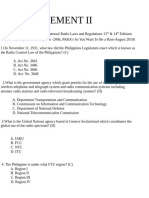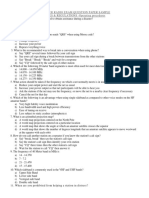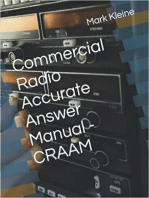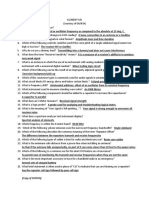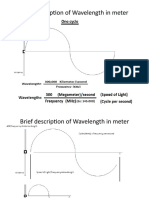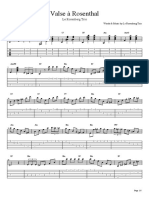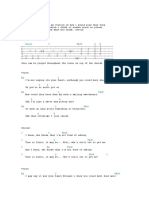0 ratings0% found this document useful (0 votes)
21 viewsElement II B
Element II B
Uploaded by
Blink Millanes LogroñoThe document contains 19 multiple choice questions about regulations and procedures related to amateur radio licensing and operations in the Philippines. The questions cover topics such as where an amateur radio license should be posted, classes of amateur licenses in the Philippines, authorized frequency bands, call sign requirements, recognized amateur radio organizations, and procedures for repeater and satellite operations.
Copyright:
© All Rights Reserved
Available Formats
Download as PPTX, PDF, TXT or read online from Scribd
Element II B
Element II B
Uploaded by
Blink Millanes Logroño0 ratings0% found this document useful (0 votes)
21 views75 pagesThe document contains 19 multiple choice questions about regulations and procedures related to amateur radio licensing and operations in the Philippines. The questions cover topics such as where an amateur radio license should be posted, classes of amateur licenses in the Philippines, authorized frequency bands, call sign requirements, recognized amateur radio organizations, and procedures for repeater and satellite operations.
Original Description:
reviewer
Copyright
© © All Rights Reserved
Available Formats
PPTX, PDF, TXT or read online from Scribd
Share this document
Did you find this document useful?
Is this content inappropriate?
The document contains 19 multiple choice questions about regulations and procedures related to amateur radio licensing and operations in the Philippines. The questions cover topics such as where an amateur radio license should be posted, classes of amateur licenses in the Philippines, authorized frequency bands, call sign requirements, recognized amateur radio organizations, and procedures for repeater and satellite operations.
Copyright:
© All Rights Reserved
Available Formats
Download as PPTX, PDF, TXT or read online from Scribd
Download as pptx, pdf, or txt
0 ratings0% found this document useful (0 votes)
21 views75 pagesElement II B
Element II B
Uploaded by
Blink Millanes LogroñoThe document contains 19 multiple choice questions about regulations and procedures related to amateur radio licensing and operations in the Philippines. The questions cover topics such as where an amateur radio license should be posted, classes of amateur licenses in the Philippines, authorized frequency bands, call sign requirements, recognized amateur radio organizations, and procedures for repeater and satellite operations.
Copyright:
© All Rights Reserved
Available Formats
Download as PPTX, PDF, TXT or read online from Scribd
Download as pptx, pdf, or txt
You are on page 1of 75
1.
Where should the Amateur Radio License
be placed in the the radio station?
1. Where should the Amateur Radio License
be placed in the the radio station?
(a) Nowhere, (b) just filed safely, (c) Posted in
a conspicuous place (d) Posted at the back of
the main door
.
1. Where should the Amateur Radio License
be placed in the the radio station?
(a) Nowhere, (b) just filed safely, (c) Posted in
a conspicuous place (d) Posted at the back of
the main door
.
• How many classes of amateurs are there in
the Philippines?
• How many classes of amateurs are there in
the Philippines?
(a) 5, (b) 4, (c) 3, (d) 2
2. How many classes of amateurs are there in
the Philippines?
(a) 5, (b) 4, (c) 3, (d) 2
• 3. What is not among the frequency bands
allocated to the Amateur Radio Service?
• 3. What is not among the frequency bands
allocated to the Amateur Radio Service?
(a) 3.500 – 3.900, (b) 7.000 – 7.200, (c) 14.000
– 14.350, (d) 25.000 – 27.990
• 3. What is not among the frequency bands
allocated to the Amateur Radio Service?
(a) 3.500 – 3.900, (b) 7.000 – 7.200, (c) 14.000
– 14.350, (d) 25.000 – 27.990
4. What size of the Call sign characters shall be
posted on the equipment itself for a portable
station?
4. What size of the Call sign characters shall be
posted on the equipment itself for a portable
station?
(a) At least 2 cm high, (b) a high least 10 cm
high, (c) at least 5.08 cm high, (d) at least 0.635
cm
4. What size of the Call sign characters shall be
posted on the equipment itself for a portable
station?
(a) At least 2 cm high, (b) a high least 10 cm
high, (c) at least 5.08 cm high, (d) at least
0.635 cm
5. The only recognized national society of
amateurs in the Philippine is,
5. The only recognized national society of
amateurs in the Philippine is,
(a) NTC, (b) Iaru, (c) PARA, (d) 2
5. The only recognized national society of
amateurs in the Philippine is,
(a) NTC, (b) Iaru, (c) PARA, (d) 2
6. What is the combination of letters and
numbers to identify a radio station known as,
6. What is the combination of letters and
numbers to identify a radio station known as,
(a) Alphanumeric, (b) License, (c) Handle, (d)
Callsign
6. What is the combination of letters and
numbers to identify a radio station known as,
(a) Alphanumeric, (b) License, (c) Handle, (d)
Callsign
• 7. A class A amateur license is also known as,
• 7. A class A amateur license is also known as,
(a) Extra Class, (b) General Class, (c) Technician
class, (d) Novice class
• 7. A class A amateur license is also known as,
(a) Extra Class, (b) General Class, (c) Technician
class, (d) Novice class
• 8. What is the distress signal for
radiotelephony?
• 8. What is the distress signal for
radiotelephony?
(a) PAN, (b) SECURITE, (c) BREAK, (d) MAYDAY
• 8. What is the distress signal for
radiotelephony?
(a) PAN, (b) SECURITE, (c) BREAK, (d) MAYDAY
• 9. What is a valid amateur call sign in the
Philippines?
• 9. What is a valid amateur call sign in the
Philippines?
(a) Y1QRT, (b) DU4PAN, (c) DV8DOC, (d)
DW6SEX
• 9. What is a valid amateur call sign in the
Philippines?
(a) Y1QRT, (b) DU4PAN, (c) DV8DOC, (d)
DW6SEX
• 10. After how many years may an expired
license be renewed; subject to the payment of
fees and surcharges and the assignment of a
different call sign from that of the former
license but without need for retaking the
examination?
• 10. After how many years may an expired
license be renewed; subject to the payment of
fees and surcharges and the assignment of a
different call sign from that of the former license
but without need for retaking the examination?
(a) ore than 5 years, (b) more than 2 years but
less than 5 years, (c) more than 3 years but less
than 5 years, (d) more than 4 years but less than
5 years
• 10. After how many years may an expired
license be renewed; subject to the payment of
fees and surcharges and the assignment of a
different call sign from that of the former license
but without need for retaking the examination?
(a) ore than 5 years, (b) more than 2 years but
less than 5 years, (c) more than 3 years but less
than 5 years, (d) more than 4 years but less than
5 years
• 11. _______is the term for any transmission,
emission and reception of signs, signals,
writings, images, and sounds or intelligence of
any nature by wire, radio, optical or other
electromagnetic system,
• 11. _______is the term for any transmission,
emission and reception of signs, signals,
writings, images, and sounds or intelligence of
any nature by wire, radio, optical or other
electromagnetic system,
(a) Telecommunication, (b) Broadcast, (c) Radio
experimentation, (d) Propagation
• 11. _______is the term for any transmission,
emission and reception of signs, signals,
writings, images, and sounds or intelligence of
any nature by wire, radio, optical or other
electromagnetic system,
(a) Telecommunication, (b) Broadcast, (c) Radio
experimentation, (d) Propagation
• 12. What is the amateur station so designed
that it may conveniently be moved about from
place to place or personally carried and be
operated while in motion or during temporary
halts?
• 12. What is the amateur station so designed
that it may conveniently be moved about from
place to place or personally carried and be
operated while in motion or during temporary
halts?
(a) Amateur fixed station, (b) Amateur mobile
station, (c) Amateur portable station, (d)
Amateur HT station
• 12. What is the amateur station so designed
that it may conveniently be moved about from
place to place or personally carried and be
operated while in motion or during temporary
halts?
(a) Amateur fixed station, (b) Amateur mobile
station, (c) Amateur portable station, (d)
Amateur HT station
• 13. An applicant for an amateur class D license
is eligible if he passes what element?
• 13. An applicant for an amateur class D license
is eligible if he passes what element?
(a) Element II, (b) Element III, (c) Element IV,
(d) Element I
• 13. An applicant for an amateur class D license
is eligible if he passes what element?
(a) Element II, (b) Element III, (c) Element IV,
(d) Element I
• 14. What is DW, DV or DU in the formation of
amateur call sign?
• 14. What is DW, DV or DU in the formation of
amateur call sign?
(a) Station Identification, (b) Prefix, (c) Suffix,
(d) District Number
• 14. What is DW, DV or DU in the formation of
amateur call sign?
(a) Station Identification, (b) Prefix, (c) Suffix,
(d) District Number
• 15. What document shall a duly accredited
amateur club enter into with NTC for the
management of its members in the proper use
of the amateur frequency bands and
prevention of harmful interference?
• 15. What document shall a duly accredited
amateur club enter into with NTC for the
management of its members in the proper use
of the amateur frequency bands and
prevention of harmful interference?
(a) Memorandum of understanding, (b)
Memorandum of agreement, (c) Partnership
agreement, (d) Legal Cooperation Agreement
• 15. What document shall a duly accredited
amateur club enter into with NTC for the
management of its members in the proper use
of the amateur frequency bands and
prevention of harmful interference?
(a) Memorandum of understanding, (b)
Memorandum of agreement, (c) Partnership
agreement, (d) Legal Cooperation Agreement
• 16. NTC may grant the authorization to install
and operate a repeater to whom?
• 16. NTC may grant the authorization to install
and operate a repeater to whom?
(a) Only to class A amateurs, (b) to any duly
licensed amateurs, (c) only to the national
organization, (d) only to duly recognized
amateur associations, clubs or society
• 16. NTC may grant the authorization to install
and operate a repeater to whom?
(a) Only to class A amateurs, (b) to any duly
licensed amateurs, (c) only to the national
organization, (d) only to duly recognized
amateur associations, clubs or society
• 17. ______is defined as radio communication
service using space station on earth satellites
for the same purpose as those of the amateur
radio service?
• 17. ______is defined as radio communication
service using space station on earth satellites
for the same purpose as those of the amateur
radio service?
(a) Amateur Space Service, (b) Amateur Satellite
service, (c) amateur relay station, (d) amateur
repeater station
• 17. ______is defined as radio communication
service using space station on earth satellites
for the same purpose as those of the amateur
radio service?
(a) Amateur Space Service, (b) Amateur Satellite
service, (c) amateur relay station, (d) amateur
repeater station
• 18. To facilitate the reception of distress calls,
all transmission on 145.000 MHz shall be kept
to a minimum and shall not exceed how long?
• 18. To facilitate the reception of distress calls,
all transmission on 145.000 MHz shall be kept
to a minimum and shall not exceed how long?
(a) minutes, (b) 5 minutes, (c) 1 minute, (d)
Unlimited
• 18. To facilitate the reception of distress calls,
all transmission on 145.000 MHz shall be kept
to a minimum and shall not exceed how long?
(a) minutes, (b) 5 minutes, (c) 1 minute, (d)
Unlimited
• 19. How should frequency bands allocated to
a particular class of amateurs be used by duly
authorized amateurs?
• 19. How should frequency bands allocated to
a particular class of amateurs be used by duly
authorized amateurs?
(a) First come first served basis, (b) Non-sharing
basis, (c) Anybody transmit anytime, (d) Non-
Interference basis
• 19. How should frequency bands allocated to
a particular class of amateurs be used by duly
authorized amateurs?
(a) First come first served basis, (b) Non-sharing
basis, (c) Anybody transmit anytime, (d) Non-
Interference basis
• 20. How much shall NTC fine any person who
had been found to have violated the law with
illegal possession of an amateur transceiver?
• 20. How much shall NTC fine any person who
had been found to have violated the law with
illegal possession of an amateur transceiver?
(a) P2,000, (b) P4,000, (c) P6,000, (d) P2,000
and/or imprisonment of not more than 2
years for each and every offense
• 20. How much shall NTC fine any person who
had been found to have violated the law with
illegal possession of an amateur transceiver?
(a) P2,000, (b) P4,000, (c) P6,000, (d) P2,000
and/or imprisonment of not more than 2
years for each and every offense
• 21. An amateur who is a citizen or resident of
a foreign country may be authorized to
operate temporarily in the Philippines
provided he is a holder of licensed issued by
their government and his country provides the
same privilege to Filipino nationals, what do
you call this partnership or arrangement on
amateur licensing between two countries?
• 21. An amateur who is a citizen or resident of a
foreign country may be authorized to operate
temporarily in the Philippines provided he is a
holder of licensed issued by their government
and his country provides the same privilege to
Filipino nationals, what do you call this
partnership or arrangement on amateur
licensing between two countries?
(a) Joint venture agreement, (b) Reciprocal
agreement, (c) Development agreement, (d)
Confidentiality agreement
• 21. An amateur who is a citizen or resident of a
foreign country may be authorized to operate
temporarily in the Philippines provided he is a
holder of licensed issued by their government
and his country provides the same privilege to
Filipino nationals, what do you call this
partnership or arrangement on amateur
licensing between two countries?
(a) Joint venture agreement, (b) Reciprocal
agreement, (c) Development agreement, (d)
Confidentiality agreement
• 22. At least how many licensed members must
a club have, as one of the requirements, to be
accredited by the NTC?
• 22. At least how many licensed members must
a club have, as one of the requirements, to be
accredited by the NTC?
(a) 15 (b) 20 (c) 25 (d) 5
• 22. At least how many licensed members must
a club have, as one of the requirements, to be
accredited by the NTC?
(a) 15 (b) 20 (c) 25 (d) 5
• 23. Batangas is under what amateur radio
district?
• 23. Batangas is under what amateur radio
district?
(a) District 7, (b) District 5, (c) District 3, (d)
District 1
• 23. Batangas is under what amateur radio
district?
(a) District 7, (b) District 5, (c) District 3, (d)
District 1
• 24. To secure a class B amateur license, a
registered Electronics and Communication
Engineer shall be required to pass the
examination for what element?
• 24. To secure a class B amateur license, a
registered Electronics and Communication
Engineer shall be required to pass the
examination for what element?
(a) Element 1, (b) Element II, (c) Element I &
II, (d) Element IV
• 24. To secure a class B amateur license, a
registered Electronics and Communication
Engineer shall be required to pass the
examination for what element?
(a) Element 1, (b) Element II, (c) Element I &
II, (d) Element IV
• 25. To facilitate the reception of distress calls
using the emergency frequency on 2 meters,
transmissions should be kept to a minimum
and for how long?
• 25. To facilitate the reception of distress calls
using the emergency frequency on 2 meters,
transmissions should be kept to a minimum
and for how long?
(a) Not exceeding 5 minutes, (b) Not exceeding
4 minutes, (c) Not exceeding 3 minutes, (d)
Not exceeding 1 minute
• 25. To facilitate the reception of distress calls
using the emergency frequency on 2 meters,
transmissions should be kept to a minimum
and for how long?
(a) Not exceeding 5 minutes, (b) Not exceeding
4 minutes, (c) Not exceeding 3 minutes, (d)
Not exceeding 1 minute
You might also like
- RYA SRC ExamDocument12 pagesRYA SRC ExamJag Gonzalez100% (14)
- NTC RAdio Exam ReviewerDocument44 pagesNTC RAdio Exam ReviewerDemetrio Formales65% (17)
- RADWIN Certification Questionnaire PTP QA - VCC PDFDocument4 pagesRADWIN Certification Questionnaire PTP QA - VCC PDFDavid Joya100% (2)
- AUXCOM InstructorDocument43 pagesAUXCOM InstructorRonald A WalshNo ratings yet
- Maritime Test Regarding GMDSS (Questions & Answers)Document54 pagesMaritime Test Regarding GMDSS (Questions & Answers)HobbyLogic82% (22)
- Masculinity and Popular TelevisionDocument193 pagesMasculinity and Popular TelevisionKyle Patrick De GuzmanNo ratings yet
- Class C ELEMENT II Pool With HighlightsDocument7 pagesClass C ELEMENT II Pool With HighlightsJan Vincent100% (1)
- OIC ReviewerDocument37 pagesOIC ReviewerJonieLachicaNo ratings yet
- A Pop Christmas ViolaDocument8 pagesA Pop Christmas ViolaSkicu0% (1)
- Element IiDocument123 pagesElement IiBlink Millanes LogroñoNo ratings yet
- 4 Adventures: Malaysian Radio Amatuer Examination Sample Questions Answers. Q QDocument151 pages4 Adventures: Malaysian Radio Amatuer Examination Sample Questions Answers. Q QcharliechongNo ratings yet
- Radio Amateur Examination Q001-Q200Document422 pagesRadio Amateur Examination Q001-Q200charliechongNo ratings yet
- Amateur Radio Mock ExaminationDocument5 pagesAmateur Radio Mock ExaminationNeil AtanacioNo ratings yet
- Class C Set DDocument9 pagesClass C Set Dpaquitsegue554No ratings yet
- Element 2Document15 pagesElement 2Josamy MartinezNo ratings yet
- Test 2Document6 pagesTest 2Muhammad Qasim AssadNo ratings yet
- CH13 - Telecomms, ECE Laws and EthicsDocument17 pagesCH13 - Telecomms, ECE Laws and EthicsNorman OcoNo ratings yet
- ReviewerDocument7 pagesReviewerJennifer EvangelistaNo ratings yet
- ASOC Exam Sample Question Paper 2Document19 pagesASOC Exam Sample Question Paper 2pratham29786No ratings yet
- Commercial Pilots License - Radio Aids (Typical Questions)Document60 pagesCommercial Pilots License - Radio Aids (Typical Questions)tanmayNo ratings yet
- Element IV BDocument75 pagesElement IV BBlink Millanes LogroñoNo ratings yet
- NTC3Document5 pagesNTC3reyNo ratings yet
- Amateur Radio Licensing Examitation Question BankDocument183 pagesAmateur Radio Licensing Examitation Question BankSuvendu SahaNo ratings yet
- EST - Laws and Standards - NotesDocument37 pagesEST - Laws and Standards - NotesElmarie RecorbaNo ratings yet
- DX3EVM Mock Examination San Fdo PampDocument11 pagesDX3EVM Mock Examination San Fdo PampEmmanuel Vallejos100% (1)
- Quiz 3 QuestionsDocument22 pagesQuiz 3 QuestionsTrina Ritchell AquinoNo ratings yet
- Compulsory Core Questions (With Answers) 8.1 Communications: Gfa Radio Telephone Operator Endorsement ExaminationDocument8 pagesCompulsory Core Questions (With Answers) 8.1 Communications: Gfa Radio Telephone Operator Endorsement ExaminationAlin SmtNo ratings yet
- MCQ BroadcastingDocument50 pagesMCQ BroadcastingLorenz Ardiente100% (5)
- AungDocument228 pagesAunghtayhlaaungNo ratings yet
- NTC MEMORANDUM MCQsDocument6 pagesNTC MEMORANDUM MCQsayanon nonNo ratings yet
- NTC Reviewer PresentationDocument98 pagesNTC Reviewer Presentationjimenezkath25No ratings yet
- Module 5.the Space Segment Access and Utilization List of Easy QuestionsDocument11 pagesModule 5.the Space Segment Access and Utilization List of Easy QuestionsAbhijeet SalviNo ratings yet
- PARA Radio Operator ExamDocument4 pagesPARA Radio Operator ExamFrancis DedumoNo ratings yet
- Regulation DGCA CPL Question PaperDocument9 pagesRegulation DGCA CPL Question PaperabeyNo ratings yet
- SMALLTEST OpsPerfDocument3 pagesSMALLTEST OpsPerfkikiNo ratings yet
- RT Question PaperDocument4 pagesRT Question PaperToomas TarvoNo ratings yet
- Study Guide For Extra Class Exam Questions: Question Pool 1Document120 pagesStudy Guide For Extra Class Exam Questions: Question Pool 1Nor MenaNo ratings yet
- Contoh Soalan RAEDocument14 pagesContoh Soalan RAEMathias KundapinNo ratings yet
- Television EngineeringDocument6 pagesTelevision Engineeringcrazy about readingNo ratings yet
- GMDSS İngi̇li̇zceDocument17 pagesGMDSS İngi̇li̇zceserhatNo ratings yet
- ECE LAWS and ETHICS QuestionnaireDocument59 pagesECE LAWS and ETHICS QuestionnaireAisha Zaleha LatipNo ratings yet
- ECE LAWS and ETHICS QuestionnaireDocument59 pagesECE LAWS and ETHICS QuestionnaireAisha Zaleha LatipNo ratings yet
- CCNA Sample Test QuestionsDocument3 pagesCCNA Sample Test Questionscisco1095No ratings yet
- Fa 22 27Document6 pagesFa 22 27oftanamarcoNo ratings yet
- Class C and D Reviewer: By: BGN 4Document53 pagesClass C and D Reviewer: By: BGN 4edzNo ratings yet
- AMSA GMDSS TestQ - Vers101 PDFDocument43 pagesAMSA GMDSS TestQ - Vers101 PDFJag GonzalezNo ratings yet
- Fundamentals of TransmissionDocument57 pagesFundamentals of TransmissionKRISHANUNo ratings yet
- TV BroadcastingDocument32 pagesTV BroadcastingChester Kyles ColitaNo ratings yet
- RGPV Syllabus Grading Ec 804 TV and Radar EngineeringDocument2 pagesRGPV Syllabus Grading Ec 804 TV and Radar Engineeringhp1301727No ratings yet
- RAE LagiDocument35 pagesRAE Lagimyscribd57No ratings yet
- GOC Aug 3Document40 pagesGOC Aug 3Jade EspirituNo ratings yet
- 2015 06 17 Decision No 15 of 2015 On Determining The Fees For The Use of Radio Spectrum ENDocument9 pages2015 06 17 Decision No 15 of 2015 On Determining The Fees For The Use of Radio Spectrum ENvannak ichNo ratings yet
- GMDSS QuestionaireDocument29 pagesGMDSS QuestionaireNi CkNo ratings yet
- Law Feedback Paper 2Document10 pagesLaw Feedback Paper 2momanbh100% (1)
- Sample QA Amateur Radio Exam Element 2 Radio Laws v2Document4 pagesSample QA Amateur Radio Exam Element 2 Radio Laws v2Almira TaupNo ratings yet
- 2017 NTC Citizens CharterDocument250 pages2017 NTC Citizens CharterEins BalagtasNo ratings yet
- Correct Radio Amateur Answers Manual: Technician, General and ExtraFrom EverandCorrect Radio Amateur Answers Manual: Technician, General and ExtraNo ratings yet
- Oversimplified Ham Exam for Technician Class License (2022-2026)From EverandOversimplified Ham Exam for Technician Class License (2022-2026)No ratings yet
- Technician License Exam Cliff Note Manual 2014/2018From EverandTechnician License Exam Cliff Note Manual 2014/2018Rating: 2 out of 5 stars2/5 (2)
- Marine Radio Operator Permit Manual: Pass Your Marine Operator Permit ExamFrom EverandMarine Radio Operator Permit Manual: Pass Your Marine Operator Permit ExamNo ratings yet
- Element IvbDocument2 pagesElement IvbBlink Millanes LogroñoNo ratings yet
- WavelengthDocument13 pagesWavelengthBlink Millanes LogroñoNo ratings yet
- Element IV BDocument75 pagesElement IV BBlink Millanes LogroñoNo ratings yet
- Element IibDocument2 pagesElement IibBlink Millanes LogroñoNo ratings yet
- Abayon - Accomplishment ReportDocument4 pagesAbayon - Accomplishment ReportJovelyn SolanoNo ratings yet
- Agnus Dei-Partitura e PartesDocument9 pagesAgnus Dei-Partitura e PartesIsabel AnselmoNo ratings yet
- KorpiklaaniDocument4 pagesKorpiklaaniAndreiPanturuNo ratings yet
- 006 River Must Flow ChordDocument1 page006 River Must Flow Chordneajazz100% (2)
- Mapeh 5 Mapeh 6: Explains The Elements and Principles Applied CommercialartDocument7 pagesMapeh 5 Mapeh 6: Explains The Elements and Principles Applied CommercialartSiuen BaseaNo ratings yet
- Understanding The Right-Half-Plane ZeroDocument3 pagesUnderstanding The Right-Half-Plane ZerokurabyqldNo ratings yet
- Thibeault SoundStudiesMusic 2017Document16 pagesThibeault SoundStudiesMusic 2017mariaNo ratings yet
- Arduino Wattmeter - Electronic Measurements CodeDocument3 pagesArduino Wattmeter - Electronic Measurements CodeYuvarajaNo ratings yet
- Amplify and Forward1bst@EngeeneringbooksDocument133 pagesAmplify and Forward1bst@EngeeneringbooksmulyadiNo ratings yet
- Carnegie Mellon Statement of PurposeDocument1 pageCarnegie Mellon Statement of PurposeJordan LutyNo ratings yet
- Registration Form Event: Drum and Lyre CorpsDocument1 pageRegistration Form Event: Drum and Lyre CorpsJulie Arne Enriquez100% (1)
- Daewoo DTQ 29g1ts TSP, DTQ 29g3ts TSP (Chassiscn 217i)Document69 pagesDaewoo DTQ 29g1ts TSP, DTQ 29g3ts TSP (Chassiscn 217i)Carlos Rodriguez HernandezNo ratings yet
- LTE DL Power AllocationDocument3 pagesLTE DL Power Allocationdeepakbhl100% (1)
- Latihan Soal Adjective, Noun & Adverbial ClauseDocument1 pageLatihan Soal Adjective, Noun & Adverbial Clauselucinta dijjahNo ratings yet
- PiPER WARRIORDocument45 pagesPiPER WARRIORgjleonsNo ratings yet
- Adaptive Active Phased - Array 'Multifunction' Radars Seminar Report 03Document21 pagesAdaptive Active Phased - Array 'Multifunction' Radars Seminar Report 03praveenpv7No ratings yet
- Change My Heart O GodDocument2 pagesChange My Heart O GodEunice EbeohpNo ratings yet
- Modifica TM733 XBandRPTDocument4 pagesModifica TM733 XBandRPTkahmanNo ratings yet
- Valse À Rosenthal: D D D D D D DDocument5 pagesValse À Rosenthal: D D D D D D DLes Musik WonosariNo ratings yet
- Lesson 2 - Importance of DanceDocument2 pagesLesson 2 - Importance of DanceFA LopezNo ratings yet
- 7 Ages of MenDocument3 pages7 Ages of MenIohannes Rufus AlmariegoNo ratings yet
- Common Jazz Standards PDFDocument2 pagesCommon Jazz Standards PDFEnrico N.No ratings yet
- Maroon 5 Ft. Wiz Khalifa - PayphoneDocument7 pagesMaroon 5 Ft. Wiz Khalifa - PayphoneBenjamin IannoneNo ratings yet
- Name Language Role DOB DeathDocument4 pagesName Language Role DOB DeathAakarshit JainNo ratings yet
- Kooks Naive TabDocument3 pagesKooks Naive TabJaber AhmadNo ratings yet
- English-Training-Material Direct Indirect 2016 NMDocument42 pagesEnglish-Training-Material Direct Indirect 2016 NMUmer AhmadNo ratings yet
- SNA Invitation 2024Document9 pagesSNA Invitation 2024Khushi JoshiNo ratings yet
- Soal B. Inggris 2Document49 pagesSoal B. Inggris 2Hajra PotterNo ratings yet

















